In Haiti, the Rains and Repression Start in Earnest
By Dady Chery
Haiti Chery
Despite all the donors conferences and talk of elections, little has changed in the past five months for Haiti’s homeless and dispossessed, apart from the start of the heavy rains and an increasing repression of their freedom of speech and assembly.
On Sunday, May 30, the Nippes (southwest) region of Haiti was inundated for several hours. Although no lives were lost, many roads were blocked, and thousands of small dwellings were washed away by the floods. In several towns, the water-treatment systems are inoperative.
Other cities at high risk of flooding during the coming months are Léogâne, Croix-des-Bouquets, Cabaret, Petit-Goâve and Port-au-Prince.
With the formal inauguration of the Clinton-led IHRC (Interim Haiti Recovery Commission), the repression is now in full swing. Nevertheless, throughout Haiti, popular outbursts continue at an average of at least two a day, with increasingly more irate calls for the resignation of Preval, the departure of the U.N. Forces, the dissolution of the IHRC, and the repeal the accompanying State of Emergency law. This law is designed to ease the occupation of the country by a coalition of colonist powers that include the U.S., Canada, France, and Brazil.
The biggest marches were in Port-au-Prince, Boston, Brooklyn, and several other cities on May 18: Haitian Flag Day, or the Day of the Heroes. This show of solidarity among tens of thousands of Haitians from all sectors occasioned a rash of meetings between frightened industrialists, their foreign partners, Haiti’s electoral commission (CEP), and various former Haitian prime ministers. In subsequent days, the results of these exchanges became obvious.

Protesting the lack of shelter after they were soaked by the first heavy rain since the earthquake, Haitians took to the streets headed toward U.N. headquarters near the airport as the sun broke through the rain clouds.
Hundreds of individuals have been arrested or threatened with violence. All demonstrations are being met with force. For example, in Cap Haitian, four individuals were recently shot during a peaceful march. Simultaneously with this gag on the poor, there have been loud repeated calls from Haiti’s elite and foreign representatives for November elections.
In a move that was the height of cynicism, Mr. Edmond Mulet, the head of the U.N. forces who cheerfully promoted Clinton’s unconstitutional commission, went so far as to quote the Haitian Constitution on the matter of elections. The response from a coalition of Haiti’s major political parties has been a call for the formation of an interim government and a loud declaration that two preconditions for any free election should be the dissolution of the IHRC and Haiti’s electoral commission (CEP). The CEP currently runs its affairs from a former drug lord’s gymnasium – an eminently appropriate address, given the CEP’s numerous financial scandals.
Once again, Haiti’s most popular leaders are in grave danger. On May 15, Gabriel Bien-Aime, who headed the Education Ministry for several years and then the political party OPL (Organization du Peuple en Lutte), died of a heart attack.
As recently as April 18, Bien-Aime marched with OPL to call for the repeal of the unconstitutional state of emergency and dissolution of the IHRC. He was the last of a group of liberation-theology priests that had included Jean-Bertrand Aristide, Jean-Marie Vincent, and Jean-Pierre Louis. Aristide is in exile, and the other two priests have been assassinated. Bein-Aime was viewed by many as a future president. He is mourned by numerous educators, poor Haitians, and OPL members. Ironically, on the same day he died, a deal was made by Preval and his handlers with the Inter-American Development Bank for a foreign-controlled revamping of Haitian education.
Deals such as these,because of their commitment of public funds to the benefit of private schools, have angered public-school students. Tensions are at an all-time high between students and the U.N. forces (MINUSTAH). In a recent incident, UN troops who appeared at the gate of the University of Haiti’s anthropology campus were met by irate rock-throwing students. The soldiers arrested one student, sprayed the rest with tear gas, and confiscated many of their computers. The students in turn torched several cars.
The U.N. soldiers, who are accustomed to swaggering about in the country and humiliating poor Haitians, were stunned by the pitch of the popular outrage. Their release ofthe arrested student the same evening and apology for the incident did little to pacify anyone. On June 1, several hundred students, their instructors, and members of several popular organizations marked the sixth anniversary of MINUSTAH’s occupation of the country by demanding its departure.
The demands for Preval’s resignation likewise continue. He is charged with incompetence for his uncaring response to the earthquake. He is also considered treasonous for supporting unconstitutional measures including the formation of the IHRC, and selling public assets, including the Haitian telephone company, to foreign concerns. Before his dissolution of Haiti’s parliament in mid-April, there were numerous calls from this body for his impeachment.
Currently, the operative phrases in Haiti from the foreign occupiers are “friendship and partnership,” and “respect for sovereignty.” Imagine waking from a terrible disaster to find one of your legs missing, and Clinton’s smiling face waving it at you while he works his other hand up your skirt and crows about his great respect for you, and your friendship and partnership. What partnership?
For examples of genuine friendship toward Haiti, one has only to look at Venezuela’s forgiveness of the oil debt and gifts of medical aid and drinking water, and Cuba’s equally unfettered gifts of medical aid and a revamped public-health system.
If some foreigners prefer to exploit a disaster to promote the exchange of aid money for the employment of their nationals and a long-term dependence, that is rather predatory but certainly their prerogative.
Haitians are equally free to dismiss all partnerships entered on their behalf during a leadership collapse from a natural catastrophe. Being not of sound mind and body since the earthquake, Haiti is no shape to make contracts.
Except for the receipt of outright gifts without strings attached, all agreements made by Haitian officials with foreign parties since January 12, 2010 should be considered null and void.
Source: Haiti Chery

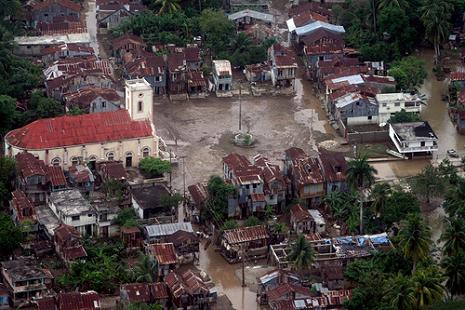
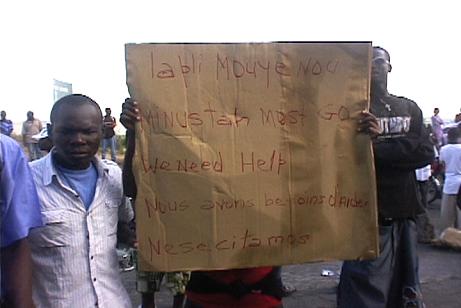
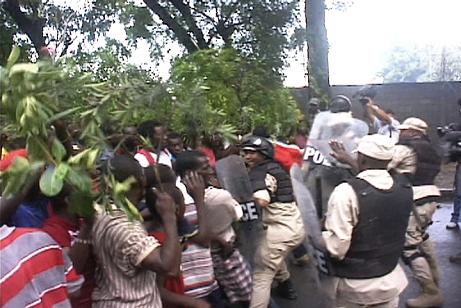
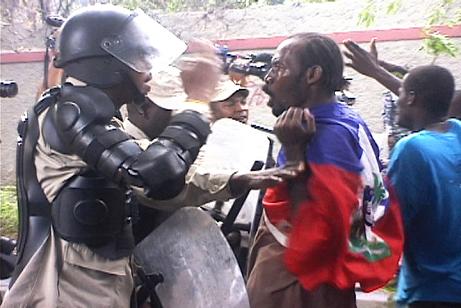
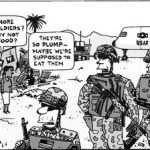

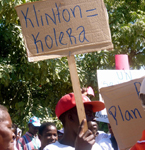
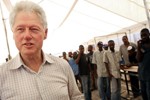
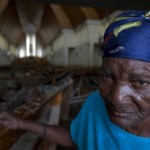
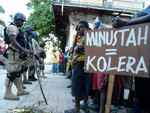
Comments
In Haiti, the Rains and Repression Start in Earnest — No Comments